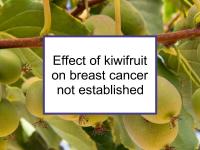Kiwifruit (Actinidia deliciosa), also know as kiwi fruit or Chinese gooseberry, is a native of Asia rich in fisetin and vitamin C. Kiwifruit is also a source of other bioactive compounds, including beta-carotene, chlorophylls, fiber, lutein, ursolic acid, vitamin E and vitamin K. Kiwifruit skin, which also incorporates these compounds, is edible.
Kiwifruit has been shown to improve cholesterol and digestive health. Kiwifruit has also been shown to have antioxidant, laxative, antifungal, antiviral, antibacterial, and cardiovascular protective effects.
Kiwifruit consumption has been found to enhance markers of immune response in laboratory mice. Regular kiwifruit consumption has also been shown in several studies to significantly increase the ability of the body to repair DNA breakage by free radicals. Fisetin, a flavonol component of kiwifruit, has been found to induce apoptosis of human colon cancer cells. Various extracts of kiwifruit have been found to have selective cytotoxic activity against human oral cancer cells.
Breast cancer-related effects of eating kiwifruit
Fisetin
The favonol fisetin has been demonstrated to inhibit the growth and migration of triple negative breast cancer cells, thus helping prevent metastasis. The cytotoxic effect of the chemotherapy drug cisplatin has been shown to be increased in triple negative breast cancer cells in the presence of fisetin. Fisetin has also been reported to induce programmed cell death in both ER+/PR+ and triple negative breast cancer cells while not harming normal breast cells. In addition, fisetin has been shown to inhibit the formation of a carcinogenic compound, 4-hydroxy-E2 (4-OHE2), from estradiol (E2), the most important estrogen.
Vitamin C
High intakes of fruits and vegetables rich in vitamin C have been found to be associated with lower breast cancer risk. Vitamin C appears to act synergistically with other nutrients in the diet to oppose cancer. Vitamin C has been found to be cytotoxic against ER+/PR+ and triple negative breast cancer cells. Vitamin C at low doses has also been demonstrated to enhance the treatment effects of cisplatin in ER+/ER+ breast cancer cells.
Additional comments
Kiwifruit sold in the U.S. normally has green flesh when ripe. However, there exist some cultivars with red flesh, and these contain more anthocyanins than green kiwifruit. Yellow-fleshed gold varieties of kiwifruit have the lowest levels of several chemopreventive compounds, including beta-carotene, dietary fiber, lutein and vitamin K (the yellow color reflects a lower chlorophyll level rather than an increase in carotenoids).
Sources of information provided in this webpage
The information above, which is updated continually as new research becomes available, has been developed based solely on the results of academic studies. Clicking on any of the underlined terms will take you to its tag or webpage, which contain more extensive information.
Note that while we are continually searching for new evidence specifically concerning kiwifruit, there is not much interest in it among breast cancer researchers, so few studies specific to this fruit are available.
